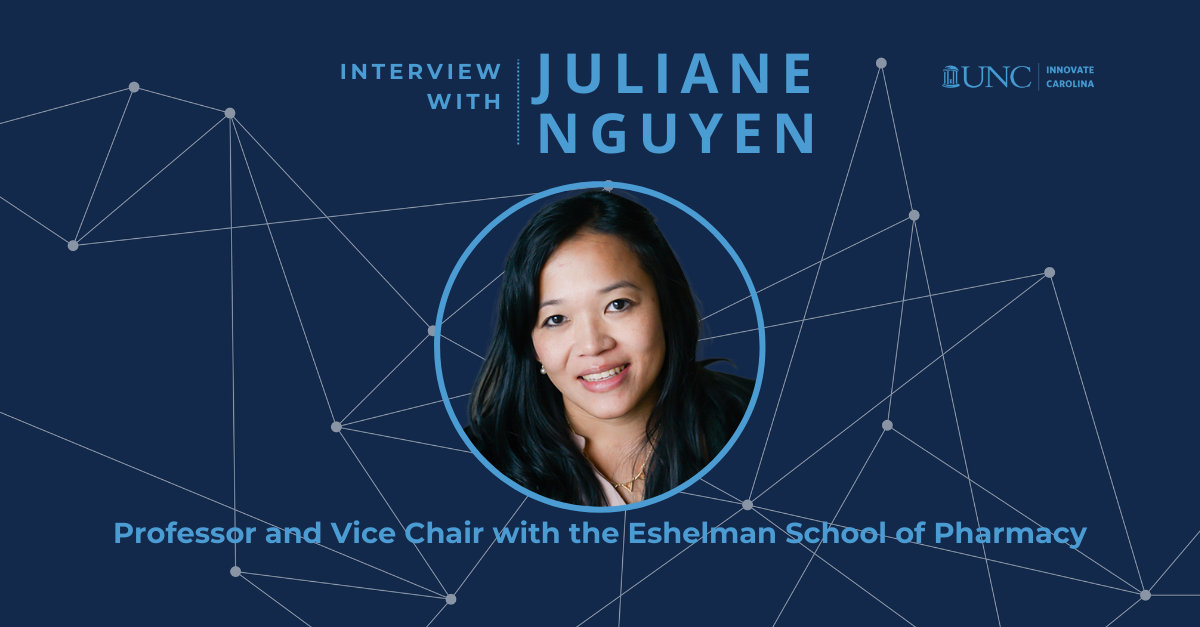The Venture Catalyst Program helps UNC faculty-founded startups converge, collaborate and grow with the support of graduate students and postdocs. As part of the program, startups and entrepreneurial mentors and Venture Catalyst (VC) fellows – select doctoral and MBA candidates and postdocs who have a passion for new venture creation and support – are matched.
Juliane Nguyen, Professor and Vice Chair with the Eshelman School of Pharmacy, shares her experience serving as a faculty innovator with the Venture Catalyst program. Juliane explores the impact of the VC fellows in identifying unmet clinical and market needs, providing transformative market research and instilling confidence in moving forward with medical technology development through mutual learning.
As a faculty innovator in the Venture Catalyst Program, how do you leverage your subject matter expertise to provide guidance and support to your mentees?
I provide the technological know-how and offer the fellows comprehensive insights into how our technology addresses unmet medical needs, disease treatment, and more. In collaboration with myself and the VC mentor, the VC fellow will conduct thorough primary and secondary market research, delving into aspects like market size, potential, competition, and other competitive advantages. Within our laboratory, our core emphasis lies in the development of safer and more effective therapeutics with the aim of benefiting patients in the future.
How does your work with the Venture Catalyst program impact your research?
As researchers, we don’t really have a clinical insight for the new technology we are developing. And so that’s what we work together with the startup mentor and the VC follows on: what type of questions are we going ask the clinicians? Because the clinicians, they treat patients, so surgeons, doctors that treat diabetic wound healing, but also burn wounds. What do they need? What are the shortcomings of cancer therapeutics? What would be the ideal treatment that would help the patients and is currently not being addressed? We work together with these fellows to develop a set of questions to ask the clinicians but also patients to help with our research and eventual clinical trials.
What is the importance of asking these questions in the early stages of your research and development?
It is important to ask these questions very early on in the process because you want to get key insights and feedback from the key stakeholders. And, in our case, those will be clinicians and patients. We want to make sure we have really designed something that is needed, and not something that would be redundant. The feedback that our VC fellows gather is invaluable in guiding our research process. The importance of asking the right questions to customers, patients or clinicians cannot be understated, as they are vital for obtaining insightful and valuable answers that will be important to move our technology forward.
How do you encourage the VC fellows to think innovatively when gathering these valuable insights?
It’s important to create a supportive environment that encourages their growth and learning. We start by setting clear goals and expectations with the VC fellows. We share insights, best practices and industry knowledge that can help VC fellows make informed decisions while keeping an open mind. This provides a framework for their decision-making process while allowing them the freedom to explore different approaches, think innovatively and go outside the box.
Can you describe the importance of working with Innovate Carolina and the value that serving as a faculty innovator has provided you?
Innovate Carolina offers an exceptional network of mentors, fellows and start-up founders who contribute to fostering connections for all participants. They provide access to a board of advisors comprised of highly experienced entrepreneurs who have been incredibly supportive in providing guidance and facilitating connections with key stakeholders. Mireya and Judy have done such an amazing job with this program. Their outstanding efforts truly deserve special recognition and appreciation, and it is such a privilege to work with them. I keep in contact with the fellows and VC mentors I have worked with, and they continue to check in and connect me with companies that may be interested our technology and continue to mentor and support us.
What has been your experience working with individual VC fellows during your time in the program?
The VC fellow are highly motivated. Both fellows I’ve worked with are extremely smart and dedicated. They pursue their PhD by day, and in their free time they do this additional market research. Because they’re really, really interested in translating therapies into the market. Their research helps us understand the potential market size of the technology we are developing. This process also helps them understand how to perform market research from start to finish. They learn about different types of applications, and how to sift through this information and synthesize it.

 | UNC-CH
| UNC-CH

